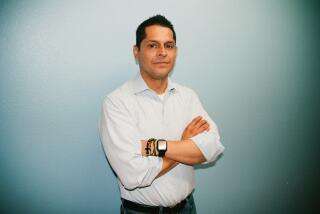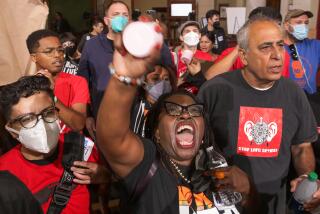Ridley-Thomas’ Bold Style Rocks Council : City Hall: Confrontations with colleagues mark brief tenure. He insists he is standing up for constituents, but critics say his effectiveness will suffer.
After only a month in office, Los Angeles City Councilman Mark Ridley-Thomas has injected much of the style of his civil rights activist background into the usually quiet--some might say somnambulant--atmosphere of the council chambers.
It has clearly made some of his colleagues uncomfortable.
Last week, the 36-year-old Ridley-Thomas engaged in separate racially tinged verbal confrontations with two older, white, conservative colleagues from the San Fernando Valley.
On Monday, he rebuked Councilman Ernani Bernardi, 79, for calling him “curly” during a council committee debate over Christopher Commission proposals for ridding the Police Department of racism and brutality.
The next day, during a council debate over a South-Central Los Angeles child-care center, he scolded Councilman Hal Bernson, 60, for wondering aloud whether Ridley-Thomas was going to bring the issue of race into every discussion.
The two incidents were not the only signs that Ridley-Thomas does not intend to be a low-profile freshman councilman. A longtime critic of racism and brutality in the Los Angeles Police Department, and of Chief Daryl F. Gates, he has taken a leading role on the committee charged with coming up with a plan to implement the Christopher Commission recommendations. He is the only black on the committee.
Ridley-Thomas also has moved quickly to improve basic city services in his district, and to make law enforcement authorities more accountable.
Most recently, he asked the Los Angeles Police Commission and the city attorney to investigate an Aug. 9 fight between two white male police officers and a black female jail employee in a Parker Center parking lot.
But the clashes with Bernardi and Bernson have drawn the most notice around City Hall.
Some council members have said that his activist’s approach to city politics could prove unproductive.
“I talked to him about it and kiddingly said, ‘You have a good sense of humor, Mark, you have to use it,’ ” said Council President John Ferraro. “Mark is bright, and he is going to understand the way the game is played here. He will find out we all want to work with him and we all have to work together.”
Bernson was more blunt, saying: “Mark has to get the chip off his shoulder.”
“I think he ought to lighten up a little bit--he doesn’t have to impress the hard-core activists in his community anymore to get elected,” Bernson said. “Everything doesn’t have to be racial. He’s got to come to terms with that.”
Councilman Joel Wachs, who sits beside Ridley-Thomas in council chambers, said there is another side to the man.
“He is very bright and very conscientious and actually very funny. We joke a lot,” Wachs said. “His sense of humor is welcome because it can ease things up a lot.”
Ridley-Thomas said the events of last week ought “to be viewed against the 35 days I’ve been here.”
“For them to talk about a trend is premature,” he said. “I don’t intend to have protracted confrontations with any member of the council.”
Nonetheless, Ridley-Thomas said he will continue to be aggressive when confronted with racism or disrespect. Institutional racism, he said, is a reality in City Hall and his impoverished 8th Council District is proof of that.
The district extends from downtown south along the Harbor Freeway, taking in the financial district, Skid Row, Koreatown, Watts and miles of aging single-family homes, apartment buildings and small businesses plagued by crime and increasingly sharp ethnic strife. The district also encompasses USC, where Ridley-Thomas received his doctorate in social ethics.
“What the council has done for decades has not necessarily accrued to the advantage of the people I represent, so something has to change,” said Ridley-Thomas, who was born and raised in South-Central Los Angeles. “The 8th District has to be taken far more seriously than it has in the past, beginning with the person who represents it.
“I came here to be a team player; a constructive and effective member of the council representing the 8th District. But I won’t be flipped off or dismissed as somebody who is a . . . racially hypersensitive rebel without a cause.”
His style, forged after years of crusading on behalf of impoverished and police-wary inner-city residents, is welcomed by many community leaders who blame institutional racism and neglect at City Hall for leaving much of his district a shambles.
This professorial man, they say, is one of a new generation of elected officials who are sensitive to racism and do not hesitate to inject issues of race and class into political debates involving depressed minority communities.
“Mark’s style can hardly hurt black folks at this tick of the watch because of the simple truth that we can’t fall off of the floor,” said the Rev. Cecil (Chip) Murray of the First African Methodist Episcopal Church of Los Angeles. “When you’re on the bottom, you can only go up.”
Ridley-Thomas, who was elected by a slim margin in the June 4 election, views his mandate as being first and foremost a representative of his council district and its 230,000 mostly African-American, Latino and Asian residents.
He had worked for years as a grass-roots activist in the district where his predecessor, Robert Farrell, was criticized for sometimes failing to return constituents’ telephone calls.
“I come to the council with a decade of leadership under my belt as head of the largest chapter of the Southern Christian Leadership Conference in the nation,” Ridley-Thomas said. “I have experience as an advocate for the very issues that those in my community want me to work on and represent them on.”
Longtime City Hall officials say Farrell paid a heavy price for focusing on race-related issues early in his career on the council. All but ignored by his colleagues for years, they say Farrell could hardly get a second on a motion until he learned to temper his remarks in the waning years of his 17-year tenure on the panel.
“Mark is confronting the realities of life on the council,” Farrell said. “If people start to focus on the messenger and not the message, it won’t work.”
Councilman Nate Holden, 60, a black who has served on the council four years, agreed, saying: “My style is to deliberately avoid racial connotations.
“I never use the terms black or white when referring to a constituent,” Holden said. “It polarizes people.”
The only other black council member is Rita Walters, 60, who was elected to the 9th Council District in the same election as Ridley-Thomas. In her 11 years as a Los Angeles school board member, Walters was often outspoken on behalf of her minority constituents, but she also is a longtime ally of Mayor Tom Bradley, a consensus builder who has based his electoral success on uniting various factions across the city.
Ridley-Thomas’ style might be closer to that of former councilwoman Gloria Molina.
Molina was regarded as scrapper who staked out positions often from the viewpoint of her largely Latino 1st Council District on the Eastside. She battled to keep a state prison out of the district, saying her constituents had freeways, jails and polluting industries dumped in their midst for years and it was time to put an end to it.
A maverick with an appetite for confrontation, Molina was able to translate political capital gained on the council into a sweeping victory in a special election to the Los Angeles County Board of Supervisors. She is arguably the most powerful Latino politician in California.
Nonetheless, her successor on the council, Mike Hernandez, moved quickly to dismiss speculation that will adopt Molina’s style when he begins his new job in two weeks.
“My style is to find consensus,” Hernandez said.
Before coming to City Hall, Ridley-Thomas worked for 10 years as executive director of the Southern Christian Leadership Conference of Los Angeles. He has served as co-chairman of the Black Leadership Coalition on Education, and chairman of the President’s Advisory Council of Charles Drew University of Science and Medicine in Los Angeles.
His political agenda has little in common with either Bernardi’s or Bernson’s.
The trouble started Monday when Bernardi was discussing at length proposed Police Department reforms during a council committee hearing and Ridley-Thomas interrupted him. “Are we talking about term limits of the chief?” asked Ridley-Thomas.
“Wait just a minute, will you curly?” snapped Bernardi.
“My name is Mark Ridley-Thomas . . . and what you said just now has very serious implications,” the councilman said. “Don’t ever say that again.”
After the meeting, Bernardi apologized in public and in private, saying his intent was not racist.
The next day, a similar confrontation erupted between Ridley-Thomas and Bernson before the full council.
Ridley-Thomas criticized the plight of “black children” at a South-Central Los Angeles child-care center declared a firetrap by building and safety officials.
When Bernson took exception to his emphasis on the fact that the children were black, Ridley-Thomas jumped out of his chair and took him aside for an explanation.
“Mr. Bernson asked if I was going to turn everything into a racial matter, and I have a problem with that,” Ridley-Thomas said. “I doubt that children in any other part of the city would be allowed to stay in such conditions, and it has to do as much with class as it has to do with race.
“When I went over to talk to Mr. Bernson about it, he said he would not allow it to go on in his district” in the San Fernando Valley, Ridley-Thomas said. “I said that is precisely what we are trying to correct.”
The flare-ups precipitated “a number of hate calls to my office,” Ridley-Thomas said. “But we had many more supportive calls from people who felt proud about the way I handled it.”
More to Read
Sign up for Essential California
The most important California stories and recommendations in your inbox every morning.
You may occasionally receive promotional content from the Los Angeles Times.











